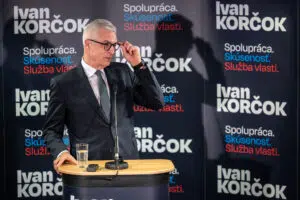Brussels – The head-to-head was almost a foregone conclusion, but the outcome of Slovakia’s first round of presidential elections in Slovakia made the race between the two favored candidates even more intriguing. Polls that opened Saturday (March 23) in the EU member country rewarded the former foreign minister and the candidate backed by the center and liberal oppositions, Ivan Korčok, who came in first ahead of the top-ranked speaker of the national parliament and leader of the ruling HLAS-SD party, Peter Pellegrini. Eyes are now on the April 6 runoff, when the orientation of voters of the seven candidates defeated in the first round will be decisive, as well as the turnout of those who decided not to vote on Saturday.

With the vote count finalized, Korčok won 42.51 percent, more than five percentage points more than Pellegrini (37.02 in line with polls before the vote). It was a brilliant achievement for the former foreign minister between 2020 and 2022 – given just below the Social Democratic challenger before the start of voting – but now it won’t be easy to go sifting through those 7.5 percentage points that separate him from succeeding the pro-European Zuzana Čaputová as President of the Republic. “Surely I have to talk to voters in the governing coalition who are opposed to the direction the country is taking, especially in foreign policy,” the candidate of the United Centrist Oppositions immediately attacked, referring to both the pro-Russian tendencies of the red-black executive led by Social Democrat Robert Fico (in which both Pellegrini’s party and the far-right Slovak National Party participate) and the growing isolationism from the traditional allies of Poland and the Czech Republic within the Visegrád group.
The real key for Korčok will be the mobilization of those who did not go to the polls on Saturday, or almost half of those eligible: only 51.9 percent of voters took part in the first round, a figure still in line with the last 20 years of elections in Slovakia. Another major factor will be the orientation of one in every five voters who did not vote for Korčok or Pellegrini, who, however, may lean more toward the latter. In particular, the ex-premier between 2018 and 2020 and leader of the party founded in 2020 after the split from SMER could cash in on the endorsement not only of the Social Democrats and far-right government allies but also of the pro-Russian-oriented third-place finisher, the former Minister of Justice between 2006 and 2009 (in the Fico government) and former president of the Supreme Court between 2009 and 2014, Štefan Harabin, who won 11.74 percent of the vote on Saturday.
The Red-Black Slovakia
After the September 30, 2023 elections in Slovakia, the pro-Russian Social Democracy of SMER-SSD emerged as the leading force in Parliament, followed by the Progressive Party of former vice president of the EU Parliament, Michal Šimečka, and the Social Democrats of HLAS-SD. Pellegrini’s 27 deputies were instrumental in forming a majority with the two pro-Russian forces – the Social Democrats of SMER and the extreme right-wing Slovak National Party – although the party leader himself assured that “with our presence, we will ensure that Slovakia’s EU and NATO membership will not be jeopardized.”

From left: Slovakia’s prime minister, Robert Fico, and HLAS-SD leader and presidential candidate, Peter Pellegrini (credits: Vladimir Simicek / Afp)
But the decision to start a pro-Moscow government also had consequences at the European level. On October 12, the presidency of the Party of European Socialism (PSE) suspended the membership of Slovakia’s SMER-SD and HLAS-SD parties, while the Progressive Alliance of Socialists and Democrats suspended the membership of the three Slovak MEPs due to concerns over policies on the merits of Russia’s war against Ukraine, migration, the rule of law, and the rights of the Lgbtq+ community. All this was compounded in the last three months by a wave of protests to greenlight the Criminal Code reform, which provides for shortening the statute of limitations for the most serious crimes – from 20 to 5 years – and the abolition of the office of the special prosecutor dealing with crimes, including those related to organized crime and high-level corruption. The opposition’s complaint is of an attempt to weaken the judiciary – in favor of Fico’s party members and supporters of the high-level government – in a country where the current prime minister had to resign in 2018 following the murder of journalist Ján Kuciak and girlfriend Martina Kušnírová, who had exposed links between the ‘ndrangheta and the Slovak elite (including members of his SMER party).
This reform of the Penal Code could open a clash with Brussels similar to the one in Hungary, which triggered the conditionality mechanism on the rule of law. At the time of the presentation of the draft, the EU Commission, the European Public Prosecutor’s Office (EPPO), and the EU Parliament warned Bratislava of the fact that changes to the Penal Code could “seriously” compromise the level of protection of the EU’s financial interests in Slovakia, specifically in the area of corruption, fraud, and mismanagement of EU funds. In this scenario, countermeasures in Brussels would be inevitable. After it entered into force on March 15 – with some slight modifications to meet the objections of the three EU institutions – the Commission is expected to evaluate the reform as a whole and decide whether there are still concerns that warrant action, ranging from infringement proceedings to activation of the rule of law conditionality mechanism.
English version by the Translation Service of Withub








